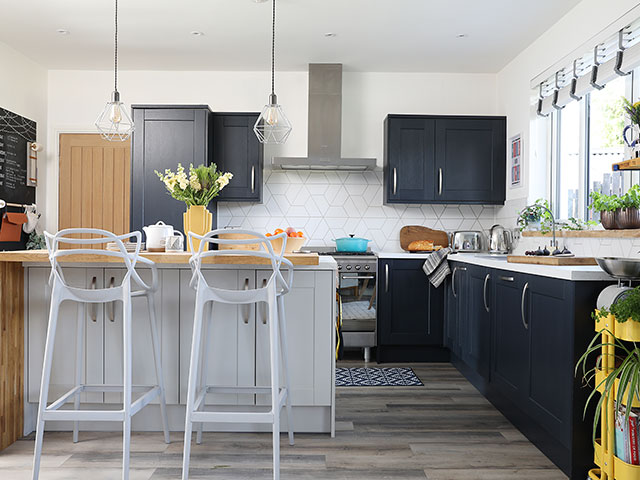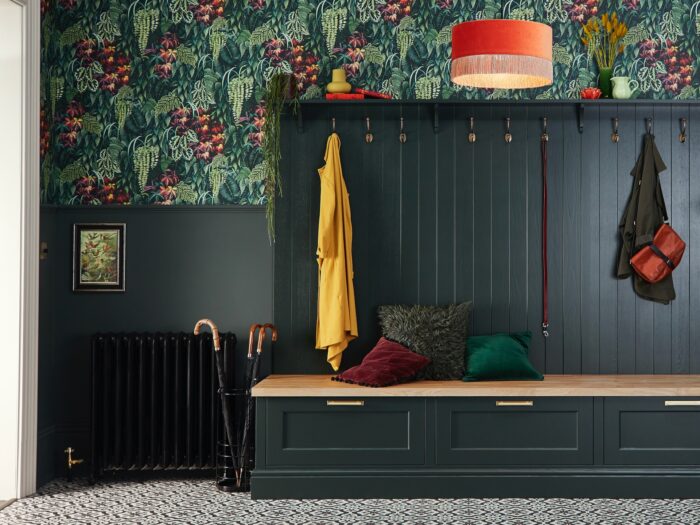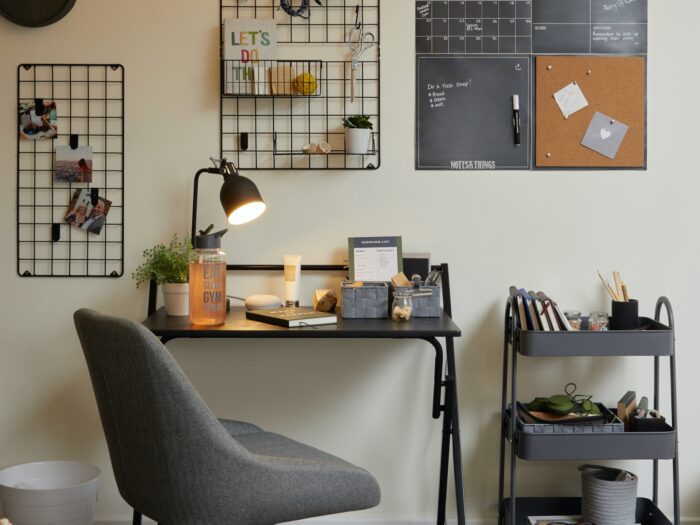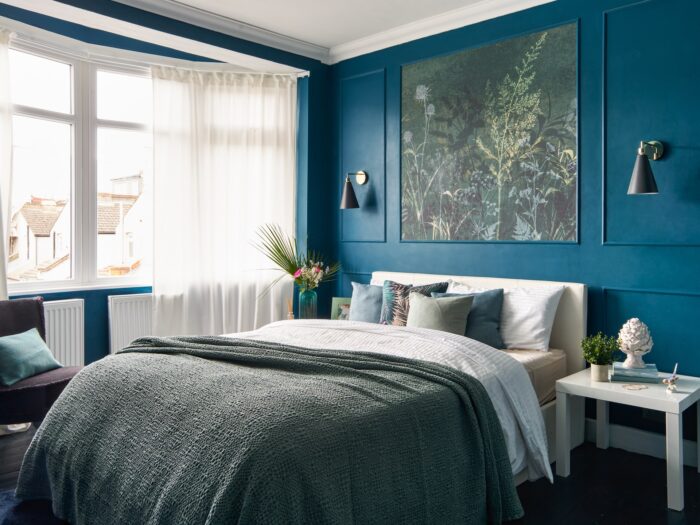
Dilly Carter
Living in chaos? Sort Your Life Out with Dilly Carter’s 8-step decluttering plan
As huge fans of BBC’s Sort Your Life Out, we often dream that Stacey Solomon and her team will show up at our homes, take our every last possession off to the nearest warehouse, edit it all down, and leave us with perfectly organised spaces. But while that’s unlikely to happen any time soon, we have the next best thing, courtesy of Stacey’s right-hand woman, Dilly Carter.
Decluttering queen Dilly has shared with us her 8-step decluttering plan of attack, so you can have your own Sort Your Life Out moment at home. Learn how to declutter your home for good, and you won’t just make less work for yourself, you’ll limit arguments, feel organised and enjoy each room more. Here’s how to get started.
1. Have a vision for every space
“The first thing we need when we’re changing our living space is vision. If we have no vision, then we can’t change our space,” says Dilly.
“Some spaces are very easy and identifiable. For example, the kitchen. But some rooms might not be – their uses become blurred. You may ask yourself, ‘is my spare room identifiable?’. Or has it got a Peloton machine and a clothes airer and spare bed and bags of clothes ready for the charity shop and the dog’s toys in it? It’s then really important to think about what you want for that space.”

Dilly suggests creating moodboards using Pinterest or Instagram or social media. “We’ve got so much inspiration around us that we can draw on,” she says.
However, she also warns that: “Not all of that inspiration might be realistic – not all of us live in big, beautiful, shiny houses. Most of us – me included – live in very average, normal houses.
“So you want a vision that works for your house, that’s relatable and is going to be functional for you and your family. Not something that is very pretty but not necessarily practical.”
2. Audit each space
“A space audit is the most valuable thing you can do,” says Dilly, who explains what’s involved. “It’s basically taking a notebook and pen, starting at your front door, walking through each room and writing down everything you need to change.
“If you’re in your porch, ask yourself: ‘Are there too many clothes here? Are there too many shoes here? What do I need to edit? What do I need to add? Do I need to add a cupboard because I hate looking at all these coats as I walk in?’ Then move into the hallway. ‘What is here? Is the furniture too big? Is there no furniture? Are shoes piled up by the side of the door? Do I need to get a shoe organiser?’
“Then walk through the kitchen. What can you see? Are all the surfaces covered in appliances? Is there paperwork everywhere? What is there that you can reduce? Are there toys in the kitchen? Is there anywhere else for the toys to go?”

Dilly adds, “A space audit will give you vital clarity on what you need to tackle, how to tackle it, and in which order, and with what help.”
3. Ask what changes need to be made
Dilly shares the kinds of questions you need to pose and answer: “If you want your spare room to become a gym, do you need to remove the spare bed? If you want it to be an office, do you need to add a desk? What is it that you need to do to make that space work? If you want your kitchen-diner to become an entertaining space, do you need to get rid of all the toys? What is it in there that is not making the space feel like what you want it to be?”
Equally, you might want to add things that will make the room feel fit for purpose. For example, in a living room, Dilly suggests making sure you have pictures, photos and soft furnishings that will make it welcoming and cosy.
4. Decide which area is a priority, and start there
To do this, Dilly suggests you think about the rooms or spaces in the home that are most dramatically affecting relationships with your family or how the house functions.
“Is it that your kids can’t eat at the table because it’s so messy, or that you can’t take a work video call because you’re embarrassed that there’s so much stuff in the background?” she says.
“Or perhaps you have to go and work in a cafe, because the state of the house is making you so stressed out, you can’t be there.”
5. Consider whether you need help
Dilly strongly recommends asking for external help if you feel overwhelmed with the clutter that surrounds you.
“More often than not, we don’t ask for help – it’s something we’re all very bad at doing. But think about how much money you spend on a daily, weekly, monthly basis. How much do you spend on coffees and brunches and lunches? On the gym, on clothes? If you were to transfer at least some of that spend to someone that came around once or twice a week to help you with your laundry or clean your bathroom, would that make a difference?” Dilly notes.

“Don’t ever struggle to do things on your own,” adds Dilly, who also suggests roping in family and friends if you’d rather not – or can’t – pay for help.
“Buy your friend a bottle of wine, and ask if they can come and help you sort out your wardrobe, or your garage,” she suggests.
“It’s always worth asking for help because the heavier those thoughts of how unhappy you are in your home get, the worse you’re going to feel, and the bigger the impact it will have on your mental health.”
6. Prime your storage
This is all about obtaining the correct storage for your space before you start your declutter, be it a shoe rack, a kitchen trolley, a new built-in wardrobe or a few floating shelves.
“If you’re investing in any kind of storage or organising product, it’s so important that you choose the right one,” says Dilly.
“Make sure it’s good quality – if you buy cheap, you buy twice.”
7. Clear the space
Let’s be realistic – most of us won’t have access to a Sort Your Life Out warehouse, where we can lay out every one of our belongings and edit them accordingly. But wherever possible, Dilly recommends moving everything out of the room or cupboard or drawer, and starting again. Or in the case of a loft, where it probably won’t be possible to bring everything down, move everything to one side, and start with half a blank space.

“If you’ve ever tried to organise or clean on top of mess, you’ll know you can’t do it,” explains Dilly.
“It’s like drawing on a piece of paper that’s already been drawn on.”
It’s then a case of sorting everything into keep, sell/give to charity and recycle/bin piles, before reintroducing only what you really need.
8. Allocate enough time and finish the job!
While professional organisers will always start and finish a job, because they are accountable, Dilly explains that most of us will fail at decluttering because we’ll fail to give ourselves enough time to do it, or simply give up halfway through.
“It’s important to allocate enough time and make sure you stick to it,” she says.
“So book that day off, or take a weekend, but make sure you see it through.”




